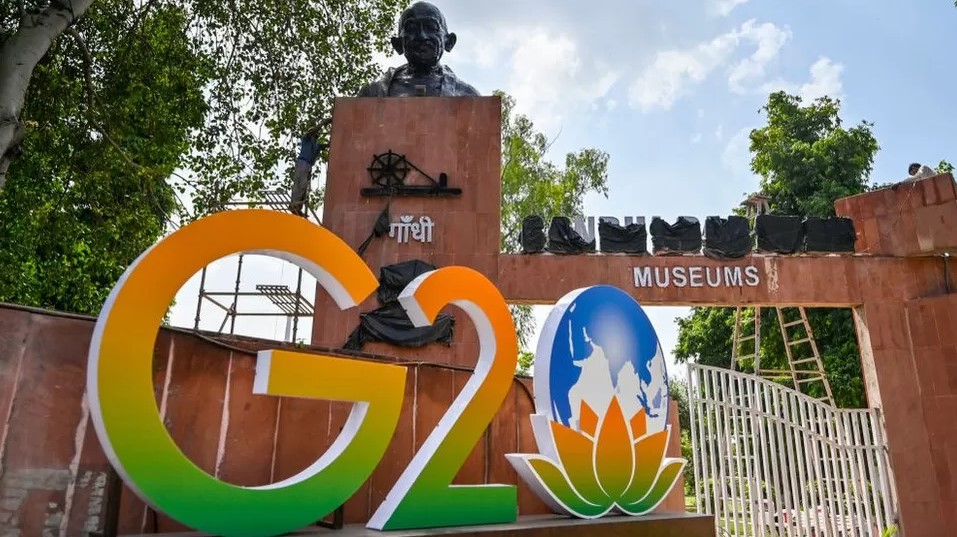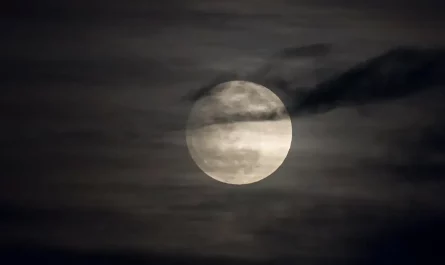The G20 has been transformed by India into a diplomatic extravaganza the likes of which have never been seen before.
The drive to transform India’s G20 presidency into a global success has reached a fever pitch in the lead-up to the leaders’ summit this weekend. Over the course of the past year, there have been 200 meetings hosted in 60 different cities throughout India.
The city of Delhi has been decked out with enormous billboards and posters that display the image of India’s Prime Minister Narendra Modi alongside a message welcoming delegates. These decorations represent India’s eagerness to engage with the rest of the globe.
And in the end, it will all come down to the leaders’ summit and their ability to make a joint declaration that suggests greater agreement on matters of global concern. This is the moment that will determine whether or not all of this effort was worthwhile.
India has been quite vocal about the need for a declaration, and it will be unprecedented if this summit concludes without one being issued. However, this is not going to be an easy task because the G20 is split on several topics, the most significant of which is the war in Ukraine.
The war also played a significant role in the G20 summit that took place in Indonesia the year before, but the group was able to quickly put together a declaration that acknowledged the varying opinions that exist within the G20 over Ukraine.
Since then, however, stances have become more entrenched; it is possible that Russia and China will not agree to make such concessions, and the West, lead by the United States, will not accept anything less than a categorical rejection of the war.
It is unfortunate that Russian President Vladimir Putin and his counterpart in China, Xi Jinping, are unable to attend, as their absence may make it more challenging to make decisions. Foreign Minister Sergey Lavrov of Russia and Premier Li Qiang of China will instead represent their own nations, but it is possible that neither of them possesses the political clout to make last-minute concessions without first consulting their respective leaders.
In the beginning of this year, the meetings of the G20 foreign and finance ministers likewise came to an end without producing a joint declaration.
However, India will continue to hold out hope that the situation in Ukraine won’t prevent it from discussing the issues that are of interest to developing countries in the Global South.
The G20 nations are responsible for 85 percent of the total economic production worldwide and 75 percent of global commerce. They account for around two-thirds of the total population of the world. As a result of the fact that it has stated on multiple occasions that the group bears a responsibility toward nations that are not now members of the G20, India has established itself as the voice of the Global South.
India’s position on the demands of the developing world has been further strengthened as a result of the participation of the African Union in the G20.
The debt crisis, growing costs of food and energy, and other such problems have been made worse as a result of the war and the epidemic. According to Tanvi Madan, a senior scholar at the Brookings Institution, “India and other developing countries in the G20 would want industrialized economies to contribute capital to resolve these issues.”
However, reaching a consensus on these matters is likewise not a given. Take, for instance, the issue of debt refinancing: India and other developing countries have been pushing that wealthy countries and institutions like the International Monetary Fund (IMF) should provide relief to nations that have been struggling to repay their loans. This is in response to the fact that the IMF is a member of the Group of Seven (G7).
However, there will be no successful dialogue on this issue unless China is brought up. The former president of the World Bank, David Malpass, stated in December that the world’s poorest countries owed $62 billion in annual debt service to creditors, and that two-thirds of this amount was owing to China. Malpass stepped down from his position as president of the World Bank only recently.
This has made it more likely that many nations may default on their debt, which has led to an increase in the severity of poverty as well as a spike in the cost of food and energy.
Western officials have frequently used the term “predatory lending” to describe China’s lending policies; however, the Chinese government denies that this is the case.
Ms. Madan continues by stating that developing countries “need their creditors to help them restructure their timelines,” and in certain cases “help them with more financing.”
“We don’t know what will come out of this meeting yet, but the idea has been to reach some sort of compromise,” she continues. “The meeting is scheduled for tomorrow.”
The G20 nations came to an agreement on a Common Framework (CF) for the reorganization of the debt of developing countries by the year 2020; nevertheless, progress has been slow. The West has accused China of being slow to act, which China has categorically denied doing.
But India, which has continuous border problems with China, will want to secure more commitment from affluent countries. India has called for extending the CF to other nations in the Global South (including middle-income countries), which is a move that the EU has also supported in the past.
However, this could become a barrier if the West continues to insist on laying blame for the debt problem on China.
Additionally, India wants global regulation on cryptocurrencies, as well as a revamp of institutions such as the World Bank and the International Monetary Fund. These are subjects that are expected to cause less contention than others.
Another concern that has been often brought up by Delhi is that of climate change. They have stated that some of the poorest countries are the most vulnerable as a result of extreme weather events.
In an article he published on Thursday, Mr. Modi stated that “ambitions for climate action must be matched with actions on climate finance and technology transfer.”
The disagreements that exist among the members of the committee in regards to the funding for climate change are reflected in his statements. Developing nations are hesitant to commit to aggressive goals to reduce greenhouse gas emissions because they are concerned that this could stunt their economic progress. Instead, they point the finger of blame at industrialized nations and demand that these nations shoulder a greater proportion of the burden, as well as make financial, technological, and infrastructure contributions to assist developing nations in reducing emissions.
According to Happymon Jacob, who teaches international relations at Jawaharlal Nehru University in Delhi, he does not anticipate that there will be a significant breakthrough about climate change.
“But it’s clear that it’s going to be one of the major agenda items of the G20, and Delhi would push rich countries to commit more resources to the cause,” he adds. “But it’s clear that it’s going to be one of the most important agenda items of the G20.”
Food and energy security are both topics that will be discussed, and it is anticipated that some sort of consensus may be made on these topics. However, this will be contingent on Moscow’s agreement to resume a deal with Kyiv that allowed Ukrainian grain to reach foreign markets, so it will depend on whether or not this can be accomplished. According to the opinions of several analysts, it is quite improbable that this deal will be finalized within the G20 framework.
There is a good chance that agreements will be reached on agriculture, pandemic preparedness, healthcare, and the global supply chain; however, it is not yet apparent whether these agreements will be included in the joint declaration.
In the meantime, the subject of India’s failing track record regarding human rights under Mr. Modi’s government, which critics and opposition leaders have frequently questioned, is not likely to come up as a topic of discussion.
In spite of the pressure from activists and rights groups, Western officials may decide not to bring up this issue during the meetings in India, which is considered as an essential ally in efforts to curb China’s ascent, according to analysts. India is seen as a crucial ally in these efforts.
Some observers, such as Michael Kugelman of the think tank at the Wilson Center, believe that the failure to issue a declaration would be a step backward not only for India and Mr. Modi, but also for the G20.
However, he continues by stating that India has a history of cooperating with nations that do not get along with each other, citing how India has “successfully managed its relations with both Russia and the US.”
Therefore, Delhi has the potential to be such nation that is able to overcome its differences. It desires to capitalize on its status as a stabilizer, despite the fact that doing so will be highly challenging.
According to Ms. Madan, the absence of a joint declaration won’t necessarily be a failure because Delhi will be able to release a chair’s summary (which host nations can do), which can show unanimity on 90% of the subjects. This is something that host countries can do.
A contentious G20, on the other hand, would lead many people to question the forum’s continued utility in light of the rapid pace of global change.
China has been working to increase participation in other multilateral organizations, such as the Shanghai Cooperation Organization (SCO) and the BRICs (Brazil, Russia, India, China, and South Africa). Recently, China welcomed Argentina, Egypt, Ethiopia, Iran, Saudi Arabia, and the United Arab Emirates into the organization known as the Brics. All of these countries enjoy positive relations with China.
India is one of the rare countries that is a member of both the BRICS and the SCO, in addition to being a member of Western-dominated organizations such as the Quad, the G7 (as an invited member), and the G20.
In this light, it is essential for Delhi to host a productive summit that yields results that can be put into effect. This will help to enhance India’s position as a significant global power and Mr. Modi’s reputation as an influential global leader.
It will demonstrate Delhi’s ability not just to comprehend but also to strike a balance between the opposing demands of several international forums. It would also assist bolster the image of the Indian Prime Minister at home, where national elections are scheduled to take place the following year.
The stakes are high for Mr. Modi, both at home and in the overall political order of the world, as a result of his decision to bring G20 events to smaller cities and towns in India as part of India’s foreign policy.




